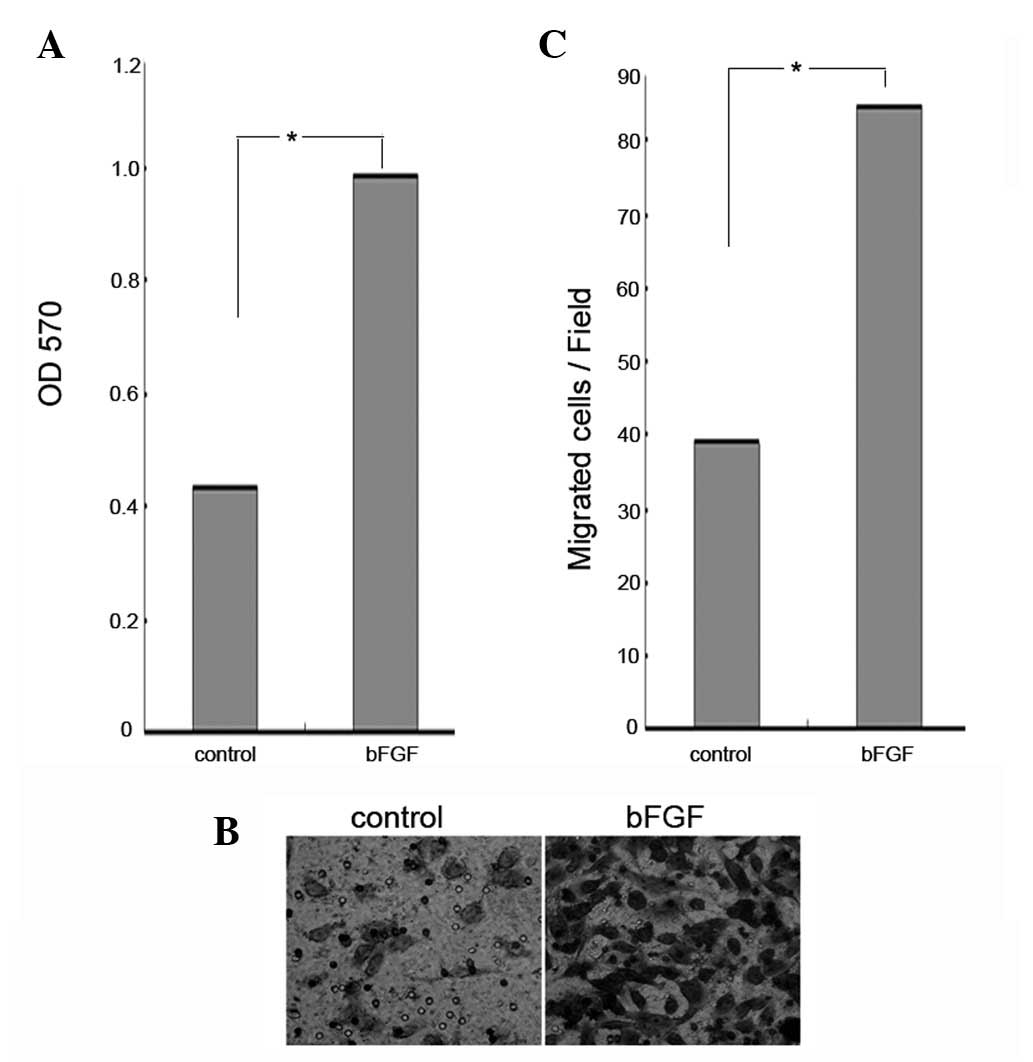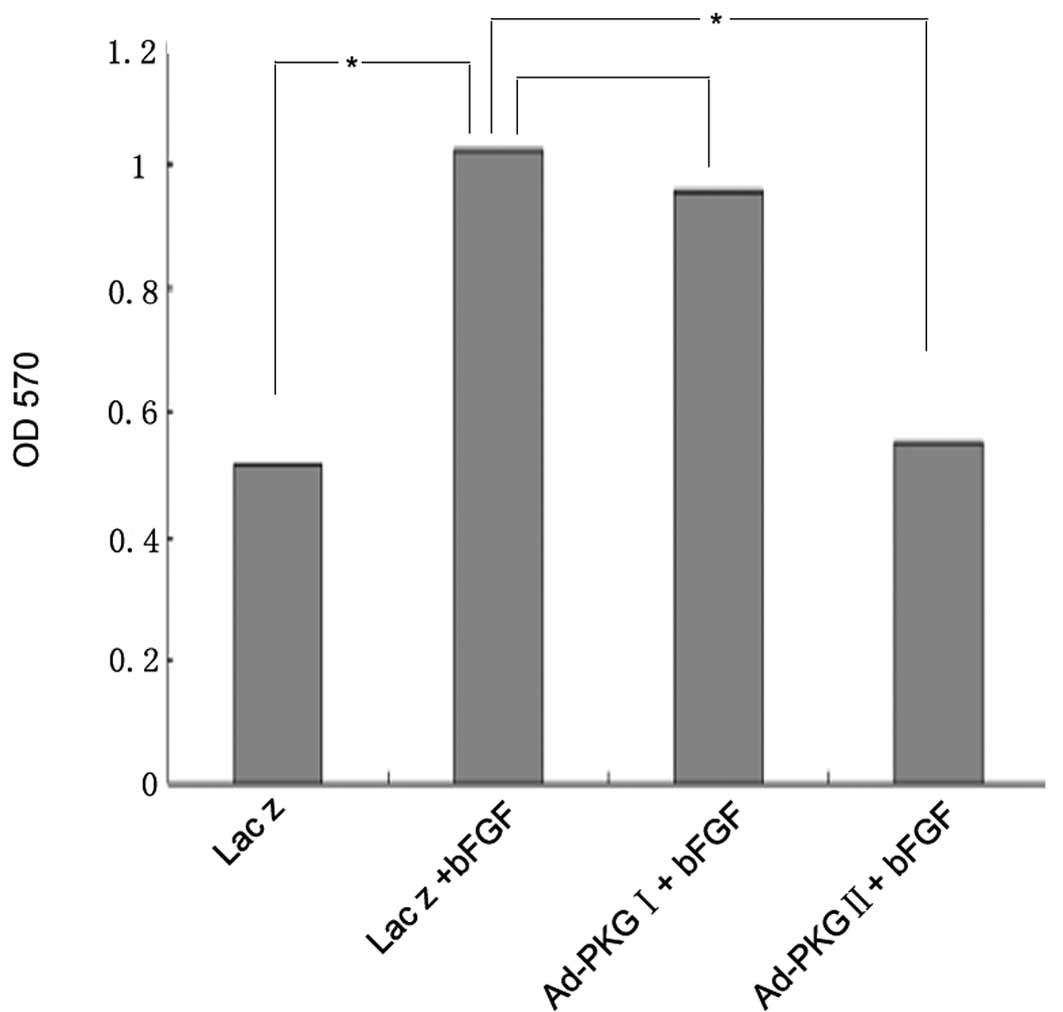|
1
|
Ribatti D, Vacca A, Rusnati M and Presta
M: The discovery of basic fibroblast growth factor/fibroblast
growth factor-2 and its role in haematological malignancies.
Cytokine Growth Factor Rev. 18:327–334. 2007. View Article : Google Scholar : PubMed/NCBI
|
|
2
|
Shi YH, Bingle L, Gong LH, Wang YX, Corke
KP and Fang WG: Basic FGF augments hypoxia induced HIF-1-alpha
expression and VEGF release in T47D breast cancer cells. Pathology.
39:396–400. 2007. View Article : Google Scholar : PubMed/NCBI
|
|
3
|
Smith JA, Madden T, Vijjeswarapu M and
Newman RA: Inhibition of export of fibroblast growth factor-2
(FGF-2) from the prostate cancer cell lines PC3 and DU145 by
Anvirzel and its cardiac glycoside component, oleandrin. Biochem
Pharmacol. 62:469–472. 2001. View Article : Google Scholar
|
|
4
|
Cronauer MV, Hittmair A, Eder IE, Hobisch
A, Culig Z, Ramoner R, Zhang J, Bartsch G, Reissigl A, Radmayr C,
Thurnher M and Klocker H: Basic fibroblast growth factor levels in
cancer cells and in sera of patients suffering from proliferative
disorders of the prostate. Prostate. 31:223–233. 1997. View Article : Google Scholar : PubMed/NCBI
|
|
5
|
Giehl KA, Nägele U, Volkenandt M and
Berking C: Protein expression of melanocyte growth factors (bFGF,
SCF) and their receptors (FGFR-1, c-kit) in nevi and melanoma. J
Cutan Pathol. 34:7–14. 2007. View Article : Google Scholar : PubMed/NCBI
|
|
6
|
Fortin D, Rom E, Sun H, Yayon A and Bansal
R: Distinct fibroblast growth factor (FGF)/FGF receptor signaling
pairs initiate diverse cellular responses in the oligodendrocyte
lineage. J Neurosci. 25:7470–7479. 2005. View Article : Google Scholar : PubMed/NCBI
|
|
7
|
Udayakumar TS, Klein RD, Maliner MS, Nagle
RB and Bowden GT: Aberrant expression of fibroblast growth factor
receptor-1 in prostate epithelial cells allows induction of
promatrilysin expression by fibroblast growth factors. Int J
Cancer. 91:187–192. 2001. View Article : Google Scholar
|
|
8
|
Kamura S, Matsumoto Y, Fukushi JI,
Fujiwara T, Iida K, Okada Y and Iwamoto Y: Basic fibroblast growth
factor in the bone microenvironment enhances cell motility and
invasion of Ewing’s sarcoma family of tumours by activating the
FGFR1-PI3K-Rac1 pathway. Br J Cancer. 103:370–381. 2010.PubMed/NCBI
|
|
9
|
Narong S and Leelawat K: Basic fibroblast
growth factor induces cholangiocarcinoma cell migration via
activation of the MEK1/2 pathway. Oncol Lett. 2:821–825.
2011.PubMed/NCBI
|
|
10
|
Zhang W, Chu YQ, Ye ZY, Zhao ZS and Tao
HQ: Expression of hepatocyte growth factor and basic fibroblast
growth factor as prognostic indicators in gastric cancer. Anat Rec
(Hoboken). 292:1114–1121. 2009. View
Article : Google Scholar : PubMed/NCBI
|
|
11
|
Massabeau C, Rouquette I, Lauwers-Cances
V, Mazières J, Bachaud JM, Armand JP, Delisle MB, Favre G, Toulas C
and Cohen-Jonathan-Moyal E: Basic fibroblast growth factor-2/beta3
integrin expression profile: signature of local progression after
chemoradiotherapy for patients with locally advanced non-small-cell
lung cancer. Int J Radiat Oncol Biol Phys. 75:696–702. 2009.
View Article : Google Scholar
|
|
12
|
Dai H, Zhao S, Xu L, Chen A and Dai S:
Expression of Efp, VEGF and bFGF in normal, hyperplastic and
malignant endo-metrial tissue. Oncol Rep. 23:795–799.
2010.PubMed/NCBI
|
|
13
|
Orstavik S, Natarajan V, Tasken K, Jahnsen
T and Sandberg M: Characterization of the human gene encoding the
type I alpha and type I beta cGMP-dependent protein kinase (PRKG1).
Genomics. 42:311–318. 1997. View Article : Google Scholar : PubMed/NCBI
|
|
14
|
Orstavik S, Solberg R, Tasken K, Nordahl
M, Altherr MR, Hansson V, Jahnsen T and Sandberg M: Molecular
cloning, cDNA structure, and chromosomal localization of the human
type II cGMP-dependent protein kinase. Biochem Biophys Res Commun.
220:759–765. 1996. View Article : Google Scholar : PubMed/NCBI
|
|
15
|
Lincoln TM, Dey N and Sellak H: Invited
review: cGMP-dependent protein kinase signaling mechanisms in
smooth muscle: from the regulation of tone to gene expression. J
Appl Physiol. 91:1421–1430. 2001.PubMed/NCBI
|
|
16
|
Shimojo T, Hiroe M, Ishiyama S, Ito H,
Nishikawa T and Marumo F: Nitric oxide induces apoptotic death of
cardiomyocytes via a cyclic-GMP-dependent pathway. Exp Cell Res.
247:38–47. 1999. View Article : Google Scholar : PubMed/NCBI
|
|
17
|
Segawa K, Minami K, Shiga Y, Shiraishi M,
Sata T, Nakashima Y and Shigematsu A: Inhibitory effects of
nicorandil on rat mesangial cell proliferation via the protein
kinase G pathway. Nephron. 87:263–268. 2001. View Article : Google Scholar : PubMed/NCBI
|
|
18
|
Loweth AC, Williams GT, Scarpello JH and
Morgan NG: Evidence for the involvement of cGMP and protein kinase
G in nitric oxide-induced apoptosis in the pancreatic B-cell line,
HIT-T15. FEBS Lett. 400:285–288. 1997. View Article : Google Scholar : PubMed/NCBI
|
|
19
|
Brunetti M, Mascetra N, Manarini S,
Martelli N, Cerletti C, Musiani P, Aiello FB and Evangelista V:
Inhibition of cGMP-dependent protein kinases potently decreases
neutrophil spontaneous apoptosis. Biochem Biophys Res Commun.
297:498–501. 2002. View Article : Google Scholar : PubMed/NCBI
|
|
20
|
Hou Y, Gupta N, Schoenlein P, Wong E,
Martindale R, Ganapathy V and Browning D: An anti-tumor role for
cGMP-dependent protein kinase. Cancer Lett. 240:60–68. 2006.
View Article : Google Scholar : PubMed/NCBI
|
|
21
|
Cook AL and Haynes JM: Protein kinase G
II-mediated proliferative effects in human cultured prostatic
stromal cells. Cell Signal. 16:253–261. 2004. View Article : Google Scholar : PubMed/NCBI
|
|
22
|
Cook AL and Haynes JM: Phosphorylation of
the PKG substrate, vasodilator-stimulated phosphoprotein (VASP), in
human cultured prostatic stromal cells. Nitric Oxide. 16:10–17.
2007. View Article : Google Scholar : PubMed/NCBI
|
|
23
|
Chiche JD, Schlutsmeyer SM, Bloch DB, de
la Monte SM, Roberts JD Jr, Filippov G, Janssens SP, Rosenzweig A
and Bloch KD: Adenovirus-mediated gene transfer of cGMP-dependent
protein kinase increases the sensitivity of cultured vascular
smooth muscle cells to the antiproliferative and pro-apoptotic
effects of nitric oxide/cGMP. J Biol Chem. 273:34263–34271. 1998.
View Article : Google Scholar
|
|
24
|
Hood J and Granger HJ: Protein kinase G
mediates vascular endothelial growth factor-induced Raf-1
activation and proliferation in human endothelial cells. J Biol
Chem. 273:23504–23508. 1998. View Article : Google Scholar : PubMed/NCBI
|
|
25
|
Swartling FJ, Ferletta M, Kastemar M,
Weiss WA and Westermark B: Cyclic GMP-dependent protein kinase II
inhibits cell proliferation, Sox9 expression and Akt
phosphorylation in human glioma cell lines. Oncogene. 28:3121–3131.
2009. View Article : Google Scholar : PubMed/NCBI
|
|
26
|
Yang SQ, Chen YC, Wang Y and Tao Y:
Expression of cGMP dependent protein kinase II in cancer cell lines
was obviously decreased. J Jiangsu Univ. 18:1–5. 2008.(In
Chinese).
|
|
27
|
Chen YC, Ren F, Sang JR, Tao Y and Xu WR:
Type II cGMP-dependent protein kinase inhibits proliferation of the
gastric cancer cell line BGC-823. Mol Med Rep. 3:361–366.
2010.PubMed/NCBI
|
|
28
|
Chen JC, Zhuang S, Nguyen TH, Boss GR and
Pilz RB: Oncogenic Ras leads to Rho activation by activating the
mitogen-activated protein kinase pathway and decreasing
Rho-GTPase-activating protein activity. J Biol Chem. 278:2807–2818.
2003. View Article : Google Scholar : PubMed/NCBI
|
|
29
|
Pardo OE, Latigo J, Jeffery RE, et al: The
fibroblast growth factor receptor inhibitor PD173074 blocks small
cell lung cancer growth in vitro and in vivo. Cancer Res.
69:8645–8651. 2009. View Article : Google Scholar : PubMed/NCBI
|
|
30
|
Nomura S, Yoshitomi H, Takano S, Shida T,
Kobayashi S, Ohtsuka M, Kimura F, Shimizu H, Yoshidome H, Kato A
and Miyazaki M: FGF10/FGFR2 signal induces cell migration and
invasion in pancreatic cancer. Br J Cancer. 99:305–313. 2008.
View Article : Google Scholar : PubMed/NCBI
|
|
31
|
Chikazu D, Hakeda Y, Ogata N, Nemoto K,
Itabashi A, Takato T, Kumegawa M, Nakamura K and Kawaguchi H:
Fibroblast growth factor (FGF)-2 directly stimulates mature
osteoclast function through activation of FGF receptor 1 and
p42/p44 MAP kinase. J Biol Chem. 275:31444–31450. 2000. View Article : Google Scholar : PubMed/NCBI
|
|
32
|
Brauchle M, Gluck D, Di Padova F, Han J
and Gram H: Independent role of p38 and ERK1/2 mitogen-activated
kinases in the upregulation of matrix metalloproteinase-1. Exp Cell
Res. 258:135–144. 2000. View Article : Google Scholar : PubMed/NCBI
|
|
33
|
Tokuda H, Kozawa O and Uematsu T: Basic
fibroblast growth factor stimulates vascular endothelial growth
factor release in osteoblasts: divergent regulation by p42/p44
mitogen-activated protein kinase and p38 mitogen-activated protein
kinase. J Bone Miner Res. 15:2371–2379. 2000. View Article : Google Scholar
|
|
34
|
Gonzalez AM, Buscaglia M, Ong M and Baird
A: Distribution of basic fibroblast growth factor in the 18-day rat
fetus: localization in the basement membranes of diverse tissues. J
Cell Biol. 110:753–765. 1990. View Article : Google Scholar : PubMed/NCBI
|
|
35
|
Folkman J and Klagsbrun M: Angiogenic
factors. Science. 235:442–447. 1987. View Article : Google Scholar
|
|
36
|
Leung DW, Cachianes G, Kuang WJ, Goeddel
DV and Ferrara N: Vascular endothelial growth factor is a secreted
angiogenic mitogen. Science. 246:1306–1309. 1989. View Article : Google Scholar : PubMed/NCBI
|
|
37
|
Ferrara N, Houck K, Jakeman L and Leung
DW: Molecular and biological properties of the vascular endothelial
growth factor family of proteins. Endocr Rev. 13:18–32. 1992.
View Article : Google Scholar : PubMed/NCBI
|
|
38
|
New BA and Yeoman LC: Identifation of
basic firoblast growth factor sensitivity and receptor and ligand
expression in human colon tumor cell lines. Cell Physiol.
150:320–326. 1992. View Article : Google Scholar : PubMed/NCBI
|
|
39
|
Hill CS and Treisman R: Transcriptional
regulation by extracellular signals: mechanisms and specificity.
Cell. 80:199–211. 1995. View Article : Google Scholar : PubMed/NCBI
|
|
40
|
Alessi DR, Cuenda A, Cohen P, Dudley DT
and Saltiel AR: PD 098059 is a specific inhibitor of the activation
of mitogen-activated protein kinase kinase in vitro and in vivo. J
Biol Chem. 270:27489–27494. 1995. View Article : Google Scholar : PubMed/NCBI
|
|
41
|
Francis SH and Corbin JD: Cyclic
nucleotide-dependent protein kinases: intracellular receptors for
cAMP and cGMP action. Crit Rev Clin Lab Sci. 36:275–328. 1999.
View Article : Google Scholar
|
|
42
|
Ruth P: Cyclic GMP-dependent protein
kinases: understanding in vivo functions by gene targeting.
Pharmacol Ther. 82:355–372. 1999. View Article : Google Scholar : PubMed/NCBI
|
|
43
|
Boerth NJ, Dey NB, Cornwell TL and Lincoln
TM: Cyclic GMP-dependent protein kinase regulates vascular smooth
muscle cell phenotype. J Vasc Res. 34:245–259. 1997. View Article : Google Scholar : PubMed/NCBI
|
|
44
|
Sellak H, Yang X, Cao X, Cornwell T, Soff
GA and Lincoln T: Sp1 transcription factor as a molecular target
for nitric oxide- and cyclic nucleotide-mediated suppression of
cGMP-dependent protein kinase-Ialpha expression in vascular smooth
muscle cells. Circ Res. 90:405–412. 2002. View Article : Google Scholar
|
|
45
|
Feil R, Hofmann F and Kleppisch T:
Function of cGMP-dependent protein kinases in the nervous system.
Rev Neurosci. 16:23–41. 2005. View Article : Google Scholar : PubMed/NCBI
|
|
46
|
Münzel T, Feil R, Mülsch A, Lohmann SM,
Hofmann F and Walter U: Physiology and pathophysiology of vascular
signaling controlled by guanosine 3′,5′-cyclic
monophosphate-dependent protein kinase [corrected]. Circulation.
108:2172–2183. 2003.
|
|
47
|
Schlossmann J, Feil R and Hofmann F:
Insights into cGMP signalling derived from cGMP kinase knockout
mice. Front Biosci. 10:1279–1289. 2005. View Article : Google Scholar : PubMed/NCBI
|
|
48
|
Wu Y, Chen Y, Qu R, Lan T and Sang J: Type
II cGMP-dependent protein kinase inhibits EGF-triggered signal
transduction of the MAPK/ERK-mediated pathway in gastric cancer
cells. Oncol Rep. 27:553–558. 2012.PubMed/NCBI
|
|
49
|
Lan T, Chen Y, Sang J, Wu Y, Wang Y, Jiang
L and Tao Y: Type II cGMP-dependent protein kinase inhibits
EGF-induced MAPK/JNK signal transduction. Oncol Rep. 27:2039–2044.
2012.PubMed/NCBI
|



















